Non-disclosure agreement (NDA): Definition & types

Nondisclosure agreement (NDA)
Safeguarding internal facts and figures is a priority for any organization to maintain a competitive edge. So what happens when your business needs to reveal private or sensitive details to another party while ensuring confidentiality?
Understanding what nondisclosure agreements (NDAs) are and how to use them is essential for legally obligating other parties to not share any classified information they might receive from you.
What is a non-disclosure agreement (NDA)?
An NDA is a legal and binding contract laying the framework for a private engagement between two or more parties. The agreement stipulates that sensitive information shared from one party to the other is strictly confidential.
Companies often require new hires to sign an NDA to prevent the sharing of any private details about the organization and its clients. This precaution is particularly important to protect companies from risks such as employees potentially leaving to start a similar business and soliciting their former employers' clients.
NDAs also play a vital role in mergers and acquisitions, where a business must disclose specific details to a potential acquirer. It's common practice for the acquiring party to sign an NDA to protect all that is shared during the negotiation process.
Similarly, many business partnerships and arrangements with independent contractors or consultants use NDAs to ensure privacy. Any party that breaches the NDA may face significant legal and financial repercussions.
What do NDAs protect?
How you use an NDA depends on your business's specific needs and the type of engagement you're entering into with another party. NDAs are adaptable and designed to safeguard various types of information. That’s why, when drafting an NDA, it’s important to specify what the signee must keep secret.
Some of the most common things NDAs protect include:
- Trade secrets: Inventions, designs, formulas, business processes, and technical specifications that are not publicly known and provide competitive value to a company.
- Strategies and business plans: Detailed business strategies, marketing tactics, expansion plans, and other operational documents critical to a company's growth and market positioning.
- Financial info: Data like earnings, profit margins, cost structures, and other financial figures that could be advantageous to competitors if leaked.
- Customer data: Sensitive or personal details about the business's clients or customers.
Types of NDAs
Businesses use various types of NDAs depending on their specific needs. Each serves different scenarios, from simple employee agreements to complex negotiations involving multiple stakeholders.
Here are three of the most common:
Unilateral NDAs
The most common type of NDA, these are used when one party (e.g., an employer) discloses confidential details to another (e.g., an employee), requiring the recipient of the information to agree not to disclose it.
Bilateral NDAs (mutual nondisclosure agreements)
Also known as mutual NDAs, bilateral NDAs are ideal when both parties in a partnership or joint venture need to exchange sensitive information. Each party agrees not to disclose any shared proprietary knowledge to outside parties, ensuring mutual protection.
Multilateral NDAs
Multilateral NDAs are used when three or more parties are involved, such as in a consortium of companies bidding on a large tender. They allow the companies to work closely and share private information securely, ensuring that all parties maintain confidentiality throughout the collaboration.
Pros and cons of NDAs
While NDAs help safeguard privacy, it's important to weigh both their benefits and potential drawbacks. This includes the scope of the NDA and its potential impact on business relationships and operational flexibility. Being clear about what specifics the NDA covers helps ensure that all parties have a mutual understanding of their obligations.
Pros
- Protect classified info: NDAs provide a legal framework to safeguard private data, allowing businesses to engage securely with partners, employees, consultants, and others instrumental in their growth.
- Provide legal support: NDAs establish a clear legal recourse for breaches. If an NDA is violated, the offending party may face legal actions, financial penalties, and reputational damage, offering a deterrent against disclosure.
- Build trust: By ensuring that sensitive information is protected under law, NDAs foster a strong trust between parties, which is essential for successful and secure business collaborations.
Cons
- Limit free flow of info: NDAs sometimes restrict the sharing of information to a degree that hampers collaboration and innovation. This is particularly problematic if the NDA's terms are ambiguous, leaving parties unsure about what they can and cannot share.
- Enforcement challenges: Vague NDAs can lead to disputes over interpretation and what information is actually protected. For organizations operating internationally, differences in legal jurisdictions can further complicate the enforcement of NDAs.
- Potential for abuse: In rare cases, an organization might misuse NDAs to cover up unethical or illegal activities. Although NDAs are not legally binding when used to shield unlawful actions, they can still temporarily prevent whistleblowers from exposing wrongdoing.
What happens if you break an NDA?
Depending on the gravity of the breach and the response of the aggrieved party, consequences can range from lawsuits seeking monetary damages to, in more severe cases, criminal charges. The violating party also risks significant reputational damage, especially if it becomes widely known that it deliberately broke an NDA. Such outcomes emphasize the critical nature of adhering to the confidentiality obligations stipulated in NDAs.
Hire with confidence and compliance
The Oyster global HR management solution empowers your business to confidently hire talent internationally. This automated platform efficiently manages payroll, benefits, and NDAs, ensuring compliance with local regulations in more than 180 countries.
Discover how Oyster can support your organization's global expansion and help maintain your competitive edge.

About Oyster
Oyster enables hiring anywhere in the world—with reliable, compliant payroll, and great local benefits and perks.

Related Resources











